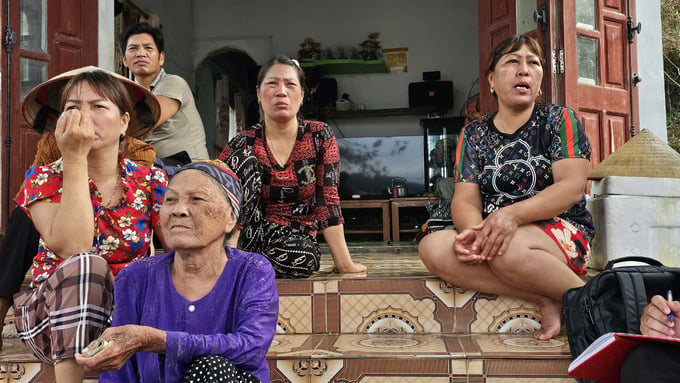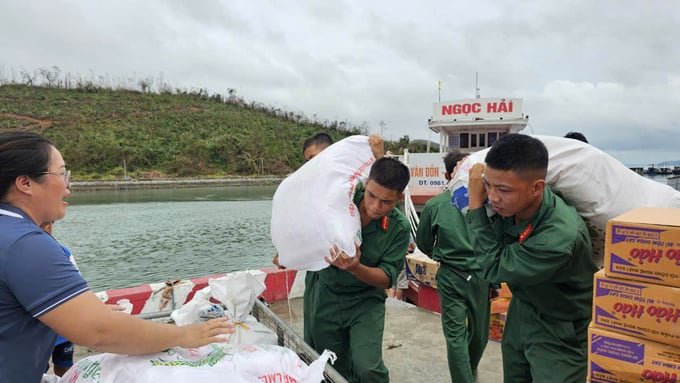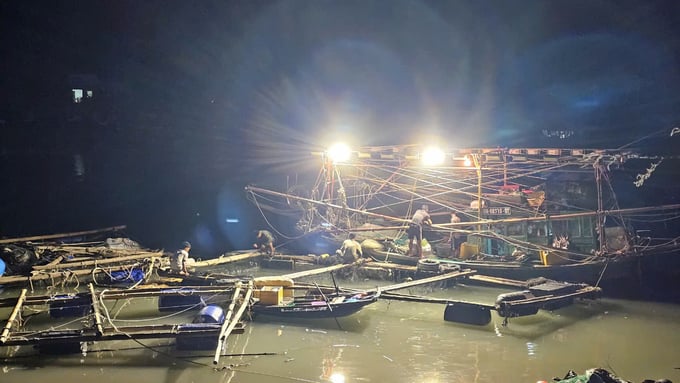May 18, 2025 | 04:15 GMT +7
May 18, 2025 | 04:15 GMT +7
Hotline: 0913.378.918
May 18, 2025 | 04:15 GMT +7
Hotline: 0913.378.918

86-year-old Pham Thi Hoa and her daughters look out to sea. Photo: Van Viet.
On the afternoon of September 11, four days after the historic Typhoon Yagi swept through Thang Loi commune (Van Don District, Quang Ninh), the scene resembled a battlefield.
The forests on the mountains surrounding the island commune in Van Don were stripped bare, leaving only the trunks reaching skyward, symbolizing the resilience of the fishermen. Yet, human strength pales in comparison to nature. The trees remain, but their leaves are completely gone. The once-green forests now look like enormous piles of firewood.
Mr. Bui Van Minh and Mrs. Nguyen Thi Hoa's 26 fish cages, which were valued at approximately 1.5 billion VND, were destroyed by the typhoon. As a result of mariculture in Cong Tay village, Thang Loi, several floating logs and more than a dozen barrel-shaped buoys were observed drifting on the sea.
Mrs. Pham Thi Hoa, an elderly mother, attempted to provide her daughter with relief. The former woman, who had resided on the island for 86 years, had never witnessed a storm as terrifying as this one. "A storm typically lasts for approximately one hour when it strikes or passes through. This one persisted for three to four hours. The sensation of the roof being torn apart, trees cracking, and walls collapsing was consistent with each gust of wind", she described the sound as resembling the explosion of explosives.
Mrs. Hoa had to comfort all 11 of her children, who all engaged in marine farming and were left empty-handed after the storm. Her seven sons, one of whom died last year, now drift on boats hoping to salvage pieces of wood, buoys, ropes, or any useful items.
At noon, six women stood dazed in front of their homes, each staring out to sea. Their husbands and children were out there. During the day, they went to salvage items, and at night they took the small boat out to fish. The family’s survival now depended on catching fish or squid each night.
With no fish near the shore and no boats further out, Mrs. Hoa and her sisters sat helplessly. The vegetables in their garden were either flattened by the storm or buried under mudslides from the mountains.
Local officials came to assess the damage. As they recorded the losses, both officials and residents ended up embracing and crying. The Thang Loi Commune People's Committee decided that only male officials would continue the damage assessment, and any recovered bank interest would be collected by proxy.
Additionally, male officials sobbed. There were only a few women sitting in the house, which was now a ruin, with their hopeful eyes fixed on the distant sea. The inside of the home was completely destroyed by the waves that engulfed it on the day of the storm. The rainfall drainage system around the house was cut down by Mrs. Hoa and her husband in response to the storm, as they were concerned that it might collapse and leave the family without shelter.
Mrs. Hoa's squid fishing craft had also capsized. This was the second occasion on which it had capsized. The family had to spend 200 million VND to salvage the boat after it was trapped on submerged rocks prior to the storm. The boat was once again submerged by the waves, despite having been recently refurbished and equipped with a costly lighting system. Upon Mrs. Hoa's conclusion of her narrative, her daughter's shoulders began to shake with tears as she submerged her head in her hands.
The 86-year-old woman once again labored to her feet, patting each of her daughters, who are now grandmothers themselves. She stated, "As long as we are alive, we still have something." Silently assisting her mother in sitting down, the eldest daughter did not shed a single tear. She exhaled, her voice raspy: "I no longer possess the capacity to weep."
"All of our accomplishments were forfeited," declared Duc, the daughter of Mrs. Hoa. They would have been harvesting fish this October if it had not been for Typhoon Yagi.

Soldiers transport relief supplies to Thang Loi island commune, Van Don district, Quang Ninh. Photo: Van Viet.
The circumstances at Mrs. Hoa's residence are common throughout Thang Loi Island. Some people have lost a few billion VND, while others have lost tens of billions. The entire island appears desolate, as if it has recently been the target of heavy bombardment. Walls have collapsed, roofs have been torn off, and trees have been either completely stripped bare or fractured. Numerous windows are shattered in the Thang Loi Commune People's Committee headquarters. Typhoon Yagi stripped a banyan tree that had stood at the committee office for decades, enduring numerous rainy seasons and cyclones, of all its leaves. The commune leaders exhaled and stated, "It is likely that it will require an additional 20 years to revert to its previous state."
The administrative building and a two-story teachers' residence are the only structures that have survived at the Thang Loi kindergarten. The teachers and Vice Principal Dang Thi Thu Van are perpetually engaging in the task of cleaning up. Nevertheless, the teachers are unable to prevent the administration building from collapsing due to fallen trees and disintegrating roofs; they are merely able to sweep the floors. The principal's and vice principal's offices remain in their current location; however, no one is willing to enter. The roof tiles have been penetrated by iron columns and roofing tiles. It is impossible to predict when it will collapse.

The kindergarten on the island commune of Thang Loi looked like it had just been bombed. Photo: Duc Binh.
Ms. Van sought assistance from the commune office; however, she was obliged to return. The damage recovery was being assisted by all of the male officials. Human endeavor alone is insufficient, regardless of the availability of assistance.
The school continues to operate with an open well, which serves as the sole water source for the instructors and numerous households in the vicinity. The clean water infrastructure that was once present on Thang Loi Island has been rendered obsolete as a result of Typhoon Yagi. The power disruption rendered it unusable, regardless of its condition.
The entire island is enveloped in darkness at night. The sole sources of illumination are the two remaining squid fishing boats, which are utilized by adults to prepare for marine trips and by children to play on the shore.

'Mature' children on Thang Loi Island take care of each other in the light from their phones. Photo: Van Viet.
No one is willing to explore the vast expanse of the ocean. It is not that they are unwilling to do so; however, the sea is currently suffused with submerged fish cages, nets, floating debris, and sunken vessels. These hazards could easily ensnare passing vessels. The entire island is now without any reliable means of support due to the damaged vessels.
At present, the exact date on which phone and internet services will be restored to their previous state is uncertain. Fishermen describe the inability to make thousands of calls during and after the hurricane. Neither of them could verify the safety of their loved ones or check on each other. Fortunately, there have been no casualties in Thang Loi. Two days following the storm, fishermen reunited in the midst of torrential rain and were unable to do anything but embrace and weep.
Despite the fact that the tempest has passed several days ago, the commune officials have assumed the role of wartime messengers. Instructions and reports are all recorded on paper. A motorcycle is utilized by one individual to communicate with another. The secretary and commune chairman are conducting the same activity.

Exploiting the light from a squid fishing boat, fishermen prepare their gear for fishing. Photo: Van Viet.
No one in Thang Loi has been spared from the devastation wrought by Typhoon Yagi. Nevertheless, there is no indication of despondency among the inhabitants of this location; rather, they snicker, "A storm cannot defeat Thang Loi Island."
Individuals who possess boats are assisting those who lack them, and they are conducting searches for missing nets and rafts. Whenever news of a submerged raft or one being carried away by the waves is reported, they motivate one another to retrieve what they can.
Mr. Nguyen Van Thanh's household is among the most severely affected. Mr. Thanh possessed 20,000 cages for a variety of fish, 200 oyster ropes, and 20 cages for species such as snappers and groupers prior to the hurricane. Additionally, he was affiliated with the aquaculture cooperative of the island, which operates within a provincial management zone of six nautical miles.
Mr. Thanh expended more than ten million VND to hire individuals to meticulously secure his equipment and bind it down in anticipation of the impending storm. Nevertheless, at 2 p.m. the following day, Mr. Thanh was taken aback by the sight of his house's roof tiles being carried away by the wind, much like a kite. The remaining tiles collapsed. Fortunately, the entire family was able to evacuate promptly.
Mr. Thanh expressed his sorrow over the storm, stating that his aquaculture operations were "destroyed, with nothing left." The damage is anticipated to be 12 billion VND.
Despite his near-poverty, Mr. Thanh's irises were devoid of any indication of despair. Conversely, they demonstrated composure and fortitude. As he conversed with visitors, his weathered hands, which had been used to years at sea, continued to deftly weave nets.
"There is a significant amount of work to be done if we have a lot, and if we have little, we must persevere and still find a way to borrow and start over." Mr. Thanh expressed his determination to persevere in his future endeavors, regardless of the circumstances.
Translated by Linh Linh

(VAN) Hue City rigorously enforces regulations regarding marine fishing and resource exploitation, with a particular emphasis on the monitoring of fishing vessels to prevent illegal, unreported, and unregulated (IUU) fishing.

(VAN) Hanoi People's Committee has issued a plan on reducing greenhouse gas emissions in the waste management sector with 2030 vision.

(VAN) Vietnam's draft amendment to Decree No. 156 proposes a mechanism for medicinal herb farming under forest canopies, linking economic development to population retention and the sustainable protection and development of forests.

(VAN) In reality, many craft village models combined with tourism in Son La have proven effective, bringing significant economic benefits to rural communities.

(VAN) The international conference titled Carbon Market: International experiences and recommendations for Vietnam was successfully held recently in Ho Chi Minh City.

(VAN) According to the Project on rearranging provincial and communal administrative units, in 2025, the country will have 34 provinces/cities, 3,321 communes, wards, and special zones, and no district-level organization.

(VAN) The vice president of fertilizer with Stone X Group says the Trump administration’s tariffs are impacting fertilizer markets.